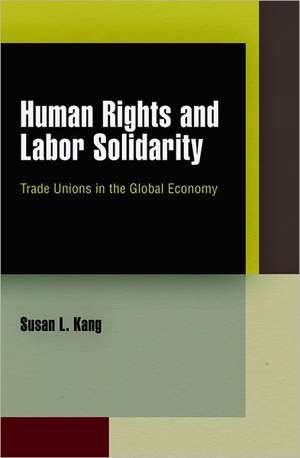Human Rights and Labor Solidarity – Trade Unions in the Global Economy: Pennsylvania Studies in Human Rights
Autor Susan L. Kangen Limba Engleză Hardback – 14 iun 2023
"Human Rights and Labor Solidarity" analyzes trade unions' campaigns to link local labor rights disputes to international human rights frameworks, thereby creating external scrutiny of governments. As a result of these campaigns, states engage in what political scientist Susan L. Kang terms a normative negotiation process, in which governments, trade unions, and international organizations construct and challenge a broader understanding of international labor rights norms to determine whether the conditions underlying these disputes constitute human rights violations. In three empirically rich case studies covering South Korea, the United Kingdom, and Canada, Kang demonstrates that this normative negotiation process was more successful in creating stronger protections for trade unions' rights when such changes complemented a government's other political interests. She finds that states tend not to respect stronger economically oriented human rights obligations due to the normative power of such rights alone. Instead, trade union transnational activism, coupled with sufficient political motivations, such as direct economic costs or strong rule of law obligations, contributed to changes in favor of workers' rights.
Din seria Pennsylvania Studies in Human Rights
-
 Preț: 240.85 lei
Preț: 240.85 lei -
 Preț: 191.81 lei
Preț: 191.81 lei -
 Preț: 243.06 lei
Preț: 243.06 lei -
 Preț: 238.67 lei
Preț: 238.67 lei -
 Preț: 194.09 lei
Preț: 194.09 lei -
 Preț: 352.65 lei
Preț: 352.65 lei -
 Preț: 275.75 lei
Preț: 275.75 lei -
 Preț: 239.77 lei
Preț: 239.77 lei -
 Preț: 198.22 lei
Preț: 198.22 lei -
 Preț: 245.25 lei
Preț: 245.25 lei -
 Preț: 246.69 lei
Preț: 246.69 lei -
 Preț: 325.82 lei
Preț: 325.82 lei - 19%
 Preț: 447.56 lei
Preț: 447.56 lei -
 Preț: 236.48 lei
Preț: 236.48 lei -
 Preț: 241.28 lei
Preț: 241.28 lei -
 Preț: 236.48 lei
Preț: 236.48 lei - 23%
 Preț: 568.46 lei
Preț: 568.46 lei -
 Preț: 238.67 lei
Preț: 238.67 lei -
 Preț: 243.94 lei
Preț: 243.94 lei -
 Preț: 477.33 lei
Preț: 477.33 lei -
 Preț: 237.35 lei
Preț: 237.35 lei - 15%
 Preț: 360.60 lei
Preț: 360.60 lei -
 Preț: 248.30 lei
Preț: 248.30 lei -
 Preț: 413.03 lei
Preț: 413.03 lei -
 Preț: 243.94 lei
Preț: 243.94 lei -
 Preț: 196.55 lei
Preț: 196.55 lei -
 Preț: 243.06 lei
Preț: 243.06 lei -
 Preț: 197.59 lei
Preț: 197.59 lei -
 Preț: 244.14 lei
Preț: 244.14 lei -
 Preț: 246.37 lei
Preț: 246.37 lei -
 Preț: 244.14 lei
Preț: 244.14 lei -
 Preț: 286.76 lei
Preț: 286.76 lei - 23%
 Preț: 538.83 lei
Preț: 538.83 lei -
 Preț: 432.36 lei
Preț: 432.36 lei -
 Preț: 193.78 lei
Preț: 193.78 lei -
 Preț: 194.09 lei
Preț: 194.09 lei -
 Preț: 194.91 lei
Preț: 194.91 lei -
 Preț: 239.10 lei
Preț: 239.10 lei -
 Preț: 443.54 lei
Preț: 443.54 lei -
 Preț: 317.05 lei
Preț: 317.05 lei -
 Preț: 197.18 lei
Preț: 197.18 lei -
 Preț: 244.45 lei
Preț: 244.45 lei - 19%
 Preț: 388.91 lei
Preț: 388.91 lei -
 Preț: 232.04 lei
Preț: 232.04 lei - 11%
 Preț: 530.16 lei
Preț: 530.16 lei -
 Preț: 313.54 lei
Preț: 313.54 lei -
 Preț: 197.18 lei
Preț: 197.18 lei -
 Preț: 292.24 lei
Preț: 292.24 lei -
 Preț: 283.21 lei
Preț: 283.21 lei -
 Preț: 241.28 lei
Preț: 241.28 lei
Preț: 529.34 lei
Preț vechi: 594.76 lei
-11% Nou
Puncte Express: 794
Preț estimativ în valută:
101.32€ • 110.09$ • 85.16£
101.32€ • 110.09$ • 85.16£
Carte tipărită la comandă
Livrare economică 21 aprilie-05 mai
Preluare comenzi: 021 569.72.76
Specificații
ISBN-13: 9780812244106
ISBN-10: 0812244109
Pagini: 336
Dimensiuni: 168 x 234 x 27 mm
Greutate: 0.59 kg
Ediția:New.
Editura: MT – University of Pennsylvania Press
Seria Pennsylvania Studies in Human Rights
ISBN-10: 0812244109
Pagini: 336
Dimensiuni: 168 x 234 x 27 mm
Greutate: 0.59 kg
Ediția:New.
Editura: MT – University of Pennsylvania Press
Seria Pennsylvania Studies in Human Rights
Recenzii
"Whether international human and labor rights instruments have any 'teeth' or influence is an important question in debates on globalization, labor policy, and economic development strategies. Susan L. Kang provides a solid account of the ways they do and the ways they don't through instructive case studies from countries on three continents. A valuable addition to the human rights, labor rights, and globalization literature."-Lance Compa, Cornell University "The declining power of trade unions in developed market economies is a well-recognized trend. The purpose of this book is to assess the usefulness of international human rights law as a means of slowing or reversing this trend. The author's conclusion, based on three well-researched and carefully analyzed case studies, is that the invocation by trade unions of the limited enforcement mechanisms available to them under international human rights instruments can materially assist their efforts to protect the rights recognized in those instruments, but this strategy is likely to succeed only when domestic political considerations outside the unions' control put pressure on a government to comply with the obligations in question."-Philip L. Harvey, Rutgers School of Law-Camden
Cuprins
Preface List of Abbreviations Chapter 1. The Precarious Position of Trade Union Rights in the Global Political Economy Chapter 2. Negotiations and Norms: The Development of Trade Union Rights in International Law and Institutions Chapter 3. International Institutions and Their Protections of Trade Union Rights Chapter 4. South Korea: International Ambitions and the Postdevelopmental State Chapter 5. United Kingdom: New Labour and New Labor Rights? Chapter 6. Canada: Federalism and Stalled Compliance Conclusion. International Norms, Trade Union Rights, and Countering Neoliberalism Appendices I. Kucera's Measure of Freedom of Association and Collective Bargaining II. Number of Unions/Unionization Rate in Korea: 1987-2003 Percentage of GPD Growth in Korea, 1961-2006 III. British Columbia Annual Growth, in Percentage of Provincial GDP IV. Case Disputes and U.S. Law Notes Bibliography Index Acknowledgments
